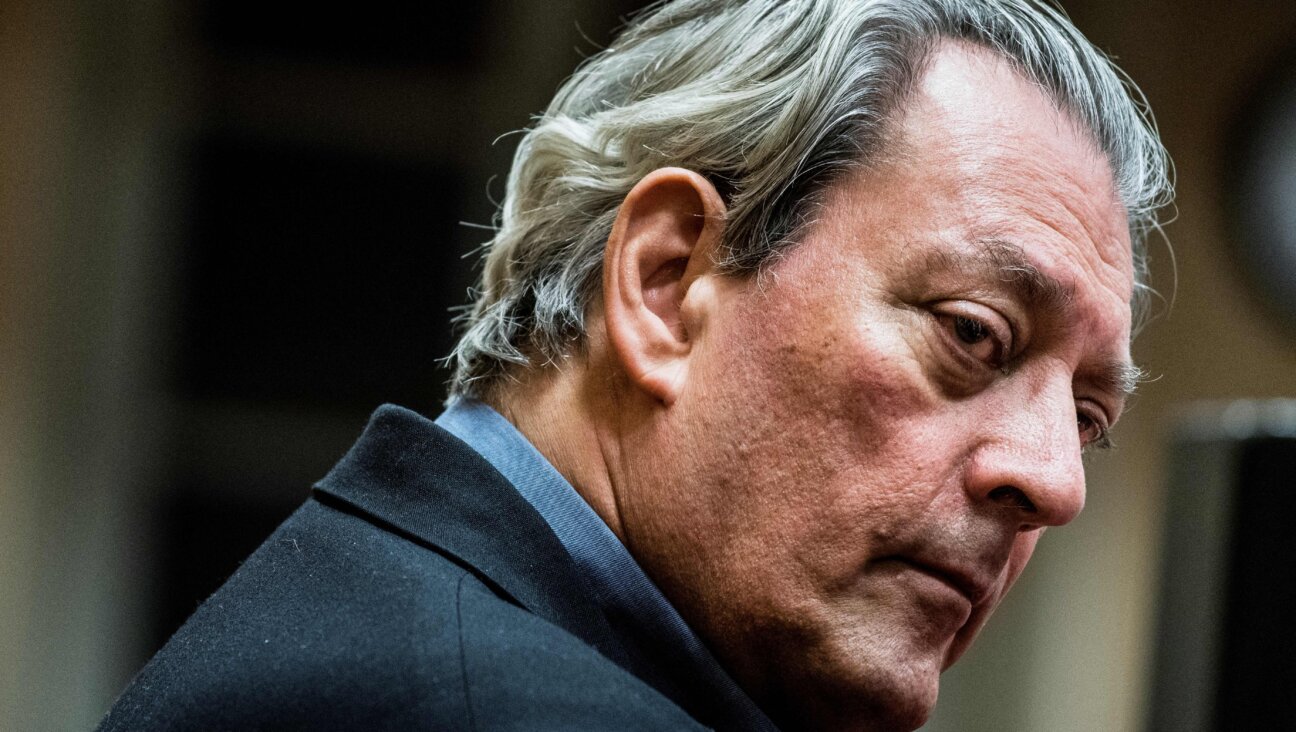Remembering Oliver Sacks, ‘Old Jewish Atheist’ With a Great Brain and Even Greater Heart

Image by Getty Images
The English Jewish neurologist and writer Oliver Sacks, who died on August 30 at age 82, was famed for such studies as “Migraine,”; “Awakenings”; “A Leg to Stand On”; and “The Man Who Mistook His Wife For A Hat: And Other Clinical Tales” These imaginative accounts of maladies ranging from sleeping-sickness to nervous tics increasingly were imbued with Sacks’ own complex history of symptoms and ailments.
The most widely known adaptation of Sacks’ work was the 1990 Robin Williams film “Awakenings” with, especially as seen in retrospect, a cagey Williams purveying Hollywood sentimentality as Sacks — at times only a step away from “Patch Adams” — while battling his own demons, and a blunt, coarse performance from Robert De Niro. Instead, the most percipient dramatic reading of the human and poetic potential of the situations described in “Awakenings” was in Harold Pinter’s 1982 short play “A Kind of Alaska,” in which production photos of Judi Dench’s performance as Deborah, a patient who is brought to consciousness after years in a coma, are deeply moving. Perhaps it is not too late for Dench to film this performance for posterity.
Another outstanding example of Sacks’ ability to inspire theatrical imaginations was the great Japanese-French actor Yoshi Oida in Peter Brook’s 1993 staging of “The Man Who…” (L’Homme qui…), an adaptation of “The Man Who Mistook His Wife For a Hat.” I vividly recall seeing a premiere performance of Brook’s play at the Bouffes du Nord theatre where the Oxford Jewish analytical approach to theatre — both Sacks and Brooks were Oxford graduates — seemed entirely apt. In turn, Yoshi Oida’s approach to incarnating brain disease was at times transmuted from the human realm to other forms of nature, evoking the stillness of a tree or the watchful terror of a bird. It was an uncanny performance, as to all evidence was Judi Dench’s. These splendid fleeting portrayals are testimony to the power of the human experience inherent in Sacks’ writings.
On a more personal level, some readers may have asked whether they would want their doctor to be an amphetamine-popping, LSD-taking, competitive weight lifter, agonizingly closeted due to a traumatic relationship with his homophobic Jewish mother, as Sacks’s recent hectic memoir “On the Move” describes. As he wrote in the “New York Times” in 2015, when his mother, a pioneering female surgeon, learned that he was gay, she reacted by shrieking: “You are an abomination. I wish you had never been born.” Sacks added poignantly: “The matter was never mentioned again, but her harsh words made me hate religion’s capacity for bigotry and cruelty.”
Sacks dealt with so many personal issues of his own, readers observed, that he could embody and fully empathize with the diseases he studied. It made for literary subject matter, but at what personal cost?
Even the resulting writings, as “On the Move” relates, sometimes began as wildly overlong effusions, bewildering editors in their sheer excessive abundance. A generation dubious of more restrained and controlled doctors, who had already embraced such medical mavericks as Thomas Szasz and R. D. Laing, embraced Sacks’ admittedly flawed, accident-prone humanity. In his frequent media appearances, many appreciated his highly educated Anglo-Jewish pronunciation of English, somewhat akin to Dr. Jacob Bronowski, a poet and scientific popularizer of altogether more self-mastery. Sacks’ flailing attempts at self-realization could at times leave him with relatively little time to observe others. In “On the Move,” the descriptions of the poet Wystan Auden, whom he knew quite well, seem oddly impersonal apart from the obvious fact that Auden drank a lot and was generous, compared to Sacks’ descriptions of his tormented, ultimately unrequited love for a fellow athlete. This is one doctor whose own case was front and center, at least in his books.
Perhaps for this reason, critics of Sacks, such as Tom Shakespeare, a British disability rights activist who nicknamed him the Man Who Mistook his Patients for a Literary Career, may have missed the mark. To be sure, while ostensibly about uncanny and baroque symptoms of suffering humanity, Sacks’ books were also usually primarily about himself, one reason for their lasting attraction. His symphonic writing style, at times Brucknerian, was another. At public readings, one of his hands would sometimes wave conductorially, as if directing the musical flow of words.
Whether this extravagant artistry interfered with what Maimonides saw as the physician’s ideal, to attentively observe the life and death of patients, is for medical ethicists to debate. Among the slew of doctor-writers published in recent decades, Oliver Sacks decisively left us some of the most vivid case histories and self-diagnoses, for which readers must be grateful.
Part of his inspiration was surely the bond of fellowship he felt with Jewish friends who shared his brainy turbulent nature, and sometimes-dramatic medical conditions. One such was Eric Korn (1933-2014), an eccentric student of natural sciences who became a renowned bookseller. With his friends Korn and Jonathan Miller, the physician and stage director, Sacks studied biology at St Paul’s School in London under the mentorship of Sid Pask. In his 2001 memoir “Uncle Tungsten: Memories of a Chemical Boyhood,” Sacks described Pask as a “splendid teacher. He was also narrow-minded, bigoted, cursed with a hideous stutter (which we would imitate endlessly), and by no means exceptionally intelligent.” The example of Pask seemed to illustrate that education, or inspiration of any kind, might derive from imperfect, unlikely sources.
Yiddishkeit was another indubitable source. In 2011, Sacks described himself to an interviewer for The Web of Stories as an “old Jewish atheist,” while nonetheless having enjoyed Jewish rituals when celebrated by his parents in his youth, including the Seder, Sukkot and Simchat Torah. Musing that he was unsure of the degree to which his parents lent credence to their own religious practices, he stated:
“I don’t know if my parents had any religious belief. It was never discussed. The house was kosher, the orthodoxies were observed, but I don’t know whether they were ever… ever believed in. In general, I think, Judaism does not enjoin nor enforce belief in the same way, say, as Catholicism. You don’t have to swallow a Trinity, you don’t have to swallow an afterlife, you may not even have to swallow a God. Basically, I think, it’s a rather ethical religion of, sort of, behave yourself down here, although there are certain cosmic things that if you… that a wrong deed will resonate throughout the universe, but so will a right deed.”
Generations of admiring readers will surely continue to find Sacks’ books to be compelling right deeds.

I hope you appreciated this article. Before you go, I’d like to ask you to please support the Forward’s award-winning, nonprofit journalism during this critical time.
Now more than ever, American Jews need independent news they can trust, with reporting driven by truth, not ideology. We serve you, not any ideological agenda.
At a time when other newsrooms are closing or cutting back, the Forward has removed its paywall and invested additional resources to report on the ground from Israel and around the U.S. on the impact of the war, rising antisemitism and the protests on college campuses.
Readers like you make it all possible. Support our work by becoming a Forward Member and connect with our journalism and your community.
Make a gift of any size and become a Forward member today. You’ll support our mission to tell the American Jewish story fully and fairly.
— Rachel Fishman Feddersen, Publisher and CEO
Join our mission to tell the Jewish story fully and fairly.






















